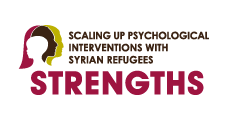“Most often, what brings people down are the problems they cannot deal with. They are overwhelmed, they feel weak because they cannot find a solution. PM+ helps you to break down your problems into smaller parts and deal with each part one by one, and it really helps,” says Madhat Kataf, 49 years old, formerly from Damascus, Syria.
The STRENGTHS programme in the Netherlands has been training Syrian refugees in PM+ (Problem Management +), a methodology that enables lay persons to provide psychosocial support and can thus quickly be scaled up. The lay persons have been trained by i-psy, an organisation specialised in intercultural psychiatry. i-psy regularly organizes supervision sessions for these trained lay persons during which they can exchange experiences with providing PM+ sessions and to learn how to improve their skills.
When Madhat asked for asylum in the Netherlands in 2015 his request was rejected and he lived on the streets for three years. “For me the first three years were very hard, because I didn’t have a status, I didn’t have rights, I didn’t have life. During that time, I wasn’t really thinking about mental support. There were days that I was down, but luckily, I had some friends that supported me. When I heard about PM+ I wanted to get involved immediately, because I know it will help people who are less active as me. It will give them more power and more strength.”
STRENGTHS is a European project supporting mental health care for Syrian refugees. It started shortly after the Syrian refugee crisis. In countries surrounding Syria where most refugees reside, there is limited knowledge about and access to psychological treatments, while in countries like Germany and the Netherlands, psychologists and psychiatrists often have difficulties in helping Syrians refugees because mental health professionals often do not speak Arabic.
In different countries, different versions of PM+ are being tested, including group sessions, sessions for children and an e-health module. In the Netherlands focus is mainly on the individual sessions. The implementation and the impact of the methodology is being tested and researched for the coming few years so it can be validated for use in other settings.


